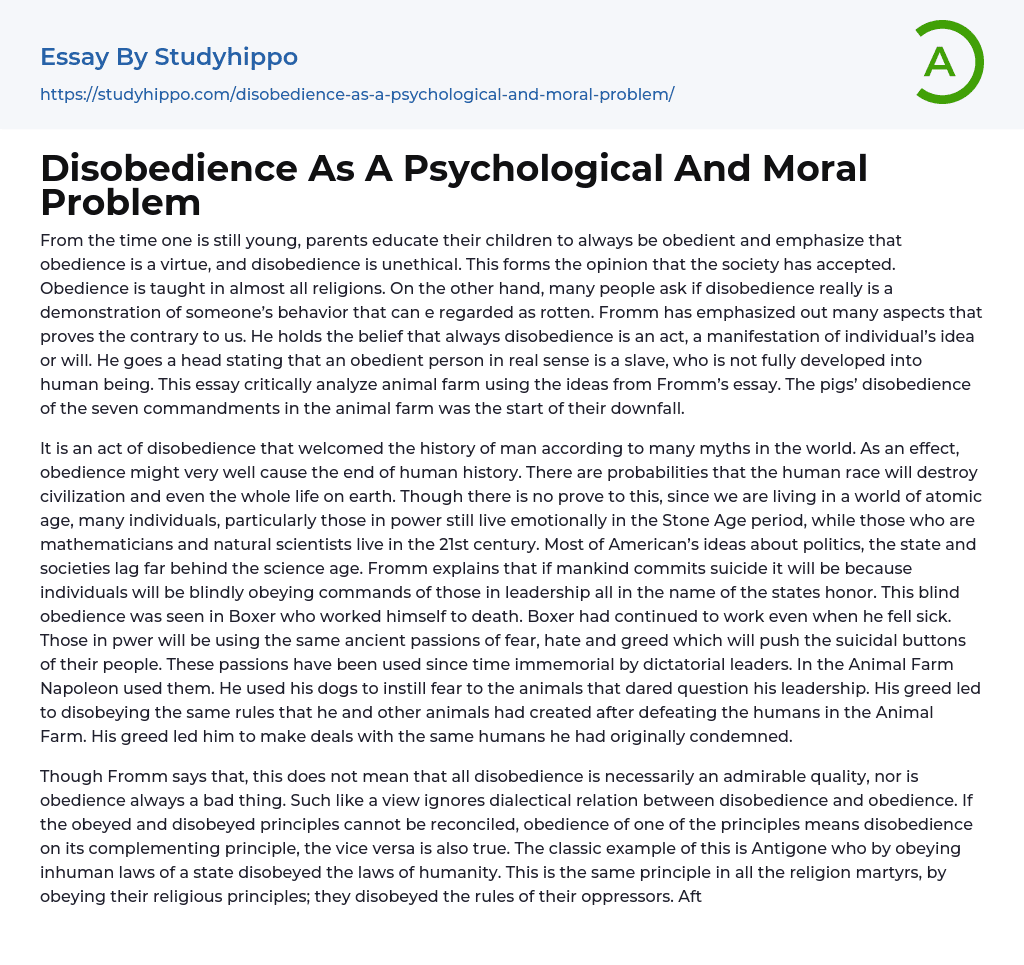

Disobedience As A Psychological And Moral Problem Essay Example
From a young age, children are taught by their parents to always be obedient and are told that obedience is virtuous while disobedience is unethical. This perspective is widely accepted in society and is even emphasized in many religions. However, some people question whether disobedience truly reflects a person's inherently bad behavior. Fromm challenges this belief by highlighting several aspects that prove the opposite. He argues that disobedience is actually an act that showcases an individual's own ideas and will. Additionally, he suggests that someone who is constantly obedient is more like a slave and has not fully developed into a human being. This essay examines the concept of disobedience in relation to Animal Farm, drawing on Fromm's ideas. The pigs' violation of the seven commandments in the farm ultimately marked the beginning of their downfall.
According to various myths aroun
...d the world, disobedience has played a significant role in human history. In contrast, obedience could potentially lead to the downfall of civilization and life on Earth. Although there is no evidence supporting this claim, many individuals in positions of power continue to hold onto outdated beliefs while mathematics and natural sciences have progressed into the 21st century. In America, political ideas are still rooted in a bygone era instead of being influenced by scientific advancements.
Fromm argues that if humanity were to perish, it would be due to unquestioning obedience justified solely by the honor of the state. This blind obedience is shown through Boxer's dedication despite his illness. Leaders who exploit their power manipulate people's emotions of fear, hatred, and greed leading them towards self-destruction. Such manipulation has been practiced throughout history by dictatorial figures
like Napoleon in Animal Farm who used fear and made deals with humans despite denouncing them.
Fromm argues that not all disobedience is admirable and not all obedience is bad. However, this viewpoint overlooks the dialectical relationship between disobedience and obedience. If the principles being obeyed and disobeyed cannot be reconciled, obeying one principle means disobeying the complementary principle, and vice versa. Antigone serves as a classic example of this, as she obeyed inhuman state laws while disobeying the laws of humanity. Similarly, religious martyrs obeyed their religious principles while disobeying the rules of their oppressors. In the animal farm rebellion, the animals obeyed the principles of Animalism but disobeyed Mr. Jones' rules. Fromm concludes that those who only obey without disobeying are slaves, exemplified by Boxer in the animal farm. On the other hand, rebels only disobey without obeying. Snowball in the Animal Farm is considered a rebel. Fromm introduces two different perceptions of conscience: authoritarian conscience and humanistic conscience. The authoritarian conscience is an inner voice that most people heed and oblige, eager to please and afraid to displease. It is also referred to as the conscience or the super-ego. On the other hand, the humanistic conscience exists in all human beings.The intuitive knowledge that guides individuals to discern what is humane and inhumane, and to differentiate between a favorable and destructive life, is essential. However, this internal sense of morality can be weakened by external influences, such as the principles of power. When one's conscience is debilitated, their ability for self-judgment and conscientiousness diminishes. This was evident in the pigs of Animal Farm, as their weakened conscience led them to mistreat their fellow
animals unknowingly. Obedience can be a product of sheer force, but this approach is vulnerable to the majority overpowering the minority through force. Moreover, when fear is the driving force behind obedience, it hinders progress and action. Therefore, it is crucial to teach people to obey willingly and not solely out of fear. In the initial stages of Animal Farm's rebellion, the animals worked together and followed the seven commandments willingly, resulting in increased production on the farm. However, as Napoleon's rule became dictatorial, fear became the main motivator for obedience among the other animals. Consequently, farm production suffered and yields were lower.Although obedience is generally considered a virtue, it may not always be the case. It is only when power is consistently good, possessed by the wise and all-knowing, that obedience can be considered virtuous. Conversely, disobedience can only be deemed a sin under these specific circumstances.
- 1984 essays
- A Farewell to Arms essays
- A Good Man Is Hard to Find essays
- A Hanging essays
- A Lesson Before Dying essays
- A Long Way Gone essays
- A Rose For Emily essays
- A Separate Peace essays
- A Tale Of Two Cities essays
- A Very Old Man With Enormous Wings essays
- Adventures Of Huckleberry Finn essays
- Alice in Wonderland essays
- All Quiet on The Western Front essays
- Allegory of the Cave essays
- An occurrence at owl creek bridge essays
- Animal Farm essays
- Anthem essays
- Antigone essays
- Arthur Conan Doyle essays
- As I Lay Dying essays
- Atticus Finch essays
- Barn Burning essays
- Battle Royal essays
- Beauty and The Beast essays
- Beloved essays
- Boo Radley essays
- Brave New World essays
- Candide essays
- Castle essays
- Characters In Hamlet essays
- Characters In Romeo And Juliet essays
- Christmas carol essays
- Chronicle of a Death Foretold essays
- Cinderella essays
- Crime and Punishment essays
- Daisy Miller essays
- Death of a Salesman American Dream essays
- Desdemona essays
- Diary Of A Wimpy Kid essays
- Dracula essays
- Dubliners essays
- Emma essays
- Ender'S Game essays
- Ethan Frome essays
- Eveline essays
- Fahrenheit 451 essays
- First-Person Narrative essays
- Fish Cheeks essays
- Frankenstein essays
- Genesis essays



